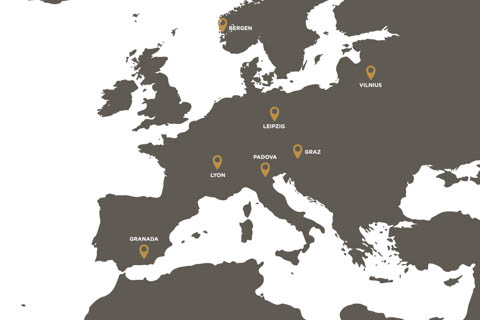 |
Faculty
Faculty of Mathematics and Informatics |
|

|
Scope of studies and length
90 ECTS credits, 1,5 year / 2,5 years part-time |
|

|
Qualification awarded
Master in Mathematical Sciences |
|

|
Application deadline*
1 May / 1 July |
|

|
Language
English |
|

|
Tuition fee per year*
6 000 € for non-EU students
5 538 € for EU students
4 000 € / 3 692 € for part-time studies
|
|

|
Start of studies
1 September
|
 |
City
Vilnius |
*The tuition fee is aligned with the national standard tuition fee and is therefore subject to change.
APPLY NOW
The aim of the programme is to educate internationally recognised professionals in Data Science who are experts in utilising the up-to-date knowledge of statistics, econometrics and data science in developing advanced mathematical (statistical) models for private and public institutions, for the purposes of planning, management, forecasting and evaluations of their activities.
Programme structure
The programme has the following structure for full-time studies*:
| Course unit title |
ECTS
credits
|
|---|
| Course unit title |
ECTS
credits
|
|---|
|
1 semester
Compulsory courses
Multivariate Statistics
Parametric and Nonparametric Econometrics
Data Mining
Natural Language and Speech Processing
Elective courses**
Modern Mathematical Economics
Panel Data Econometrics
Game Theory
Microebonometrics Analysis
Digital Image Processing
|
30.0
5.0
5.0
5.0
5.0
5.0
5.0
5.0
5.0
5.0
|
|
2 semester
Compulsory courses
Big Data Analysis
Functional Data Analysis
Elective courses**
Bayesian Statistics
Multivariate Time Series and Financial Econometrics
Sample Surveys
Deep Learning Methods
Multidimensional Data Visualization
|
30.0
10.0
10.0
5.0
5.0
5.0
5.0
5.0
|
|
3 semester
Compulsory courses
Master's Thesis Seminar
Master Thesis
|
30.0
5.0
25.0
|
*Please contact us by e-mail to learn more about the study plan of part-time studies.
**The supply of elective courses might vary depending on availability.
Key Learning Outcomes
After completing the course, the students should be able to: independently model, estimate and test relationships between variables; practically apply the basic principles of data science when analysing real data and forecasting processes; analyse big data; professionally
operate data science software; learn R and Python programming skills; and work with various databases.
Programme Specific Requirements
- Basic knowledge in mathematical analysis, matrix algebra, probability theory, statistics and informatics (R, Python, etc.) that may be tested during the motivational interview.
- The motivational interview is organised remotely. Candidates are invited to it if the Commission has questions after the evaluation of the application.
- Certain countries nationals shall be subject to the requirement to pass the OMPT-E exam with an evaluation of no less than 70 per cent.
In addition, all applicants have to fulfil the general admission requirements.
Why choose this programme?
- It’s the only study programme in the Baltics that includes advanced courses in econometrics, informatics and mathematical statistics.
- The programme is interdisciplinary, combining the subjects of data analysis, informatics and mathematical statistics.
- Depending on the student’s choice, it is possible to choose specific subjects from the fields of statistics, informatics or econometrics.
- Specialists in Data Science are very much in demand throughout the world. Data surrounds us, and everyone wants to obtain information from this data; thus, data analysis specialists are very much sought after. Data analysis is also versatile, so our graduates will get the opportunity to work in various fields. There’s no more monotonous tasks, as a computer can do these for you – but you will control the process, understand and create new methodologies, and present your results to clients and colleagues.
|
What comes after?
Analytical modelling, planning and forecasting work opportunities at various levels are open for Master’s in Data Science graduates at research centres, financial institutions in the private sector (e.g. pension funds, stock exchanges, insurance companies, commercial banks, Hi-Tech start-ups), consulting firms, the analysis and planning units of business enterprises, central banks, ministries, and other public sector institutions.
|
|
 "I chose to pursue a Master’s in Mathematical Sciences since econometricians are highly valued and in great demand in today’s data-rich world. The study program was intensive and challenging yet highly rewarding. It provided me with a solid fundament in statistical modelling and forecasting of economic and financial data. After graduation I easily got a job in an investment bank, then earned a PhD in Economics in Norway. If you are up for a challenge, a career in econometrics promises a bright future." "I chose to pursue a Master’s in Mathematical Sciences since econometricians are highly valued and in great demand in today’s data-rich world. The study program was intensive and challenging yet highly rewarding. It provided me with a solid fundament in statistical modelling and forecasting of economic and financial data. After graduation I easily got a job in an investment bank, then earned a PhD in Economics in Norway. If you are up for a challenge, a career in econometrics promises a bright future."
Daumantas Bloznelis, graduate from Lithuania
|



 "I chose to pursue a Master’s in Mathematical Sciences since econometricians are highly valued and in great demand in today’s data-rich world. The study program was intensive and challenging yet highly rewarding. It provided me with a solid fundament in statistical modelling and forecasting of economic and financial data. After graduation I easily got a job in an investment bank, then earned a PhD in Economics in Norway. If you are up for a challenge, a career in econometrics promises a bright future."
"I chose to pursue a Master’s in Mathematical Sciences since econometricians are highly valued and in great demand in today’s data-rich world. The study program was intensive and challenging yet highly rewarding. It provided me with a solid fundament in statistical modelling and forecasting of economic and financial data. After graduation I easily got a job in an investment bank, then earned a PhD in Economics in Norway. If you are up for a challenge, a career in econometrics promises a bright future."